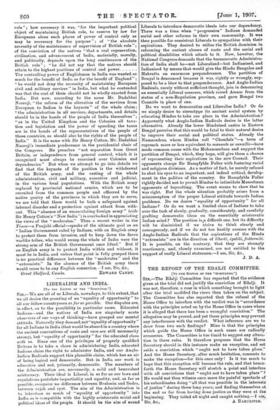LIBERALISM AND INDIA.
To THE EDITOR OF TUE ..SFECT;708.1 Sllt,—We are all of us Liberals, nowadays, 'Wilds extent, that we all desire the granting of an "equality of opportunity" to all our fellow-countrymen as far as possible. Our disputes are, in effect, as to the possibility in particular cases. Educated Indians—and the natives of India are singularly acute observers of our ways of thinking—have grasped our mental attitude. Naturally they demand, not "equality of opportunity" for all Indians in India (that would be absurd in a country where the ancient conventions of caste and race are still necessarily etrong), but "equality of opportunity" for the educated class trill; us. Since one of the privileges of properly qualified Britons is to take a share in administering India, educated Indians claim the right to administer India, and our Anglo- Indian Radicals support this plausible claim, which has an air of being logical and democratic. But in India our work is educative and not, primarily, democratic. The members of the Administration are, necessarily, a mild and benevolent aristocracy. Their ideal is Liberal; in so far as bur laws and regulations postulate impartiality and equality, and, air far as possible, recognise no difference between Brahmin and &Ara, between rajah and iyot. The aim of the Administration is to introduce so much of "equality of opportunity" into India tin is compatible with the highly aristocratic social and political ideas of the people. It should be the aim of sound
Liberals to introduce democratic ideals into our dependency. There was a time when "progressive" Indians demanded social and other reforms in their own community. It was then possible for consistent Liberals to sympathise with their aspirations. • They desired to utilise the British dominion in reforming the ancient abuses of caste and the social and political disabilities which attach to it. Now, however, the National Congress demands that the bureaucratic Administra- tion of India shall be—not Liberalised—but Indianised, and Indianised by means that would give the Hindu .Bengalee and Mahratta an enormous preponderance. • The partition of Bengal is denounced because it was, rightly or wrongly, sup- posed thins a blow to that preponderance. And Anglo-Indian Radicals, surely without sufficient thought, join in denouncing an essentially Liberal measure, which raised Assam front the status of a non-Regulation province, and gave Bengal two Councils in place of one.
Do we want to democratise and Liberalise India? Or do we simply desire to stereotype its ancient social system by educating Hindus to take our place in the Administration ? Apparently what Auglo-Iudian Radicals desire is the latter alternative. Already the lower Hinduised castes in Eastern Bengal perceive that this would be fatal to their natural desire to improve their social and political status. Already the Namasudras, whom Hindus call " Chandals "—a term of reproach more or less equivalent to manuals or canaille—have made common cause with the Mohammedans and support the partition of Bengal, which, they hope, will give them a chance of representing their aspirations in the new Council. Their opponents charge Sir Bampfylde Fuller with fostering racial and religious divisions. As a matter of fact, be merely refused to shut his eyes to an important, and indeed critical, develop- ment in the politics of the country. Sir Bampfylde Fuller rightly decided not to permit Hindus to intimidate Mussulman opponents of boycotting. The event seems to show that he was right. But the whole situation probably arises from a misconception of the proper Liberal attitude towards Indian problems. Do we desire "equality of opportunity" for all Indians P Or do we want a limited class of Indians to take over the task of slowly, gradually, considerately, and carefully grafting democratic ideas on the essentially aristocratic Indian mind ? The position is,a difficult one, but its difficulty will be diminished if we strive to think clearly and courageously, and if we do not too hastily assume with the Anglo-Indian Radicals that the aspirations of the Hindu "extremists" are in the direction of liberti, igaliti, fr.:Um-1We. It is possible,. on the contrary, that they are strongly reactionary, and, closely examined, are not entitled to the support of really Liberal statesmen.—I am, Sir, &c.,
J. D. A.






































 Previous page
Previous page